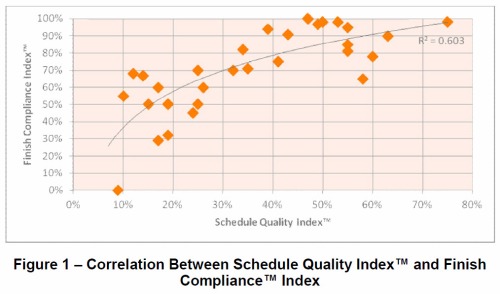We all know good scheduling leads to better project outcomes – certainly for me it’s been a article of faith for most of the last 40 years and ‘obvious’ from observation. But ask me, and any other scheduler I know to prove this fact and we would be hard pressed to come up with anything substantive.
Over the years there have been many surveys that link the lack of effective planning to poor project outcomes. One of the more definitive was undertaken by the CIOB in 2008 (download the report ‘Managing the Risk of Delayed Completion in the 21st Century’). But showing projects tend to fail if they don’t use effective planning and scheduling is not the same as showing that good planning and scheduling enhances the probability of success.
This has now changed! A paper published by Dr Dan Patterson, the CEO of Acumen, demonstrates a clear link between good schedules (defined as technically competent schedules) and good project outcomes.
 Figure 1, taken from Dan’s paper Does Better Scheduling Drive Execution Success? Published in November’s PM World Today shows a strong correlation between the technical competence used to develop the schedule and the number of activities that finished on time. The data is based on a sample of 35 large projects ranging from US$15 million to US$30 billion.
Figure 1, taken from Dan’s paper Does Better Scheduling Drive Execution Success? Published in November’s PM World Today shows a strong correlation between the technical competence used to develop the schedule and the number of activities that finished on time. The data is based on a sample of 35 large projects ranging from US$15 million to US$30 billion.
Link the CIOB findings with Dan’s data and the message is blindingly obvious – if you are running a large project without a competent scheduler supporting the management team with effective scheduling, you are virtually guaranteeing failure!
Hopefully the work currently being undertaken by Planning Planet, CIOB and others to develop a framework (or frameworks) to train and qualify competent schedulers will mean in the next year or two there will be enough good schedulers to meet the demand from business and industry. For more on this see: Should you certify your schedulers? and watch this space…. There are a number of announcements due in the next couple of weeks.

I agree with you; is very important to know how make the work to elaborate the schedule; it is the firts stage in planning.
A great title to a solid point Pat. Perhaps a good follow up would be a discussion on what drives poor scheduling practices. In my opinion, it starts in 2 areas. One is the human factor, of practicing the game of padding estimates for various personal/political reasons, and the other is lack of good overall insight into the task and resource balances.
A couple of blogs by Lynda on ‘Culture eats strategy for breakfast’ may explain the reluctance to introduce good process – the second one will be up shortly.
Pingback: Culture eats strategy for breakfast 2! « Stakeholder Management's Blog
Pingback: Culture eats strategy for breakfast 2! | Mosaicproject’s Blog
Maybe it is not the project which is late but the expectations which are unrealistic. The CIOB report indicates that most projects did not have viable project plans (based upon network logic) at all, so it is hard to see what criterion success would be measured against. If a project finishes “late” is that because it was badly managed or because the projected completion date was never achievable in the first place?
Even when a project plan is based upon a good network it can still be hopelessly unrealistic if it is analyzed by traditional deterministic cpm. To paraphrase Murphy, if there are many things which could go wrong then at least one probably will. The only way to get a realistic plan is to reflect the uncertainty in the estimated durations using schedule risk analysis. Inexpensive tools exist to do this. In the Microsoft Project world for example one can use Risk+ or my own Full Monte.
We been saying for decades ‘unrealistic expectations are unlikely to be fulfilled’.